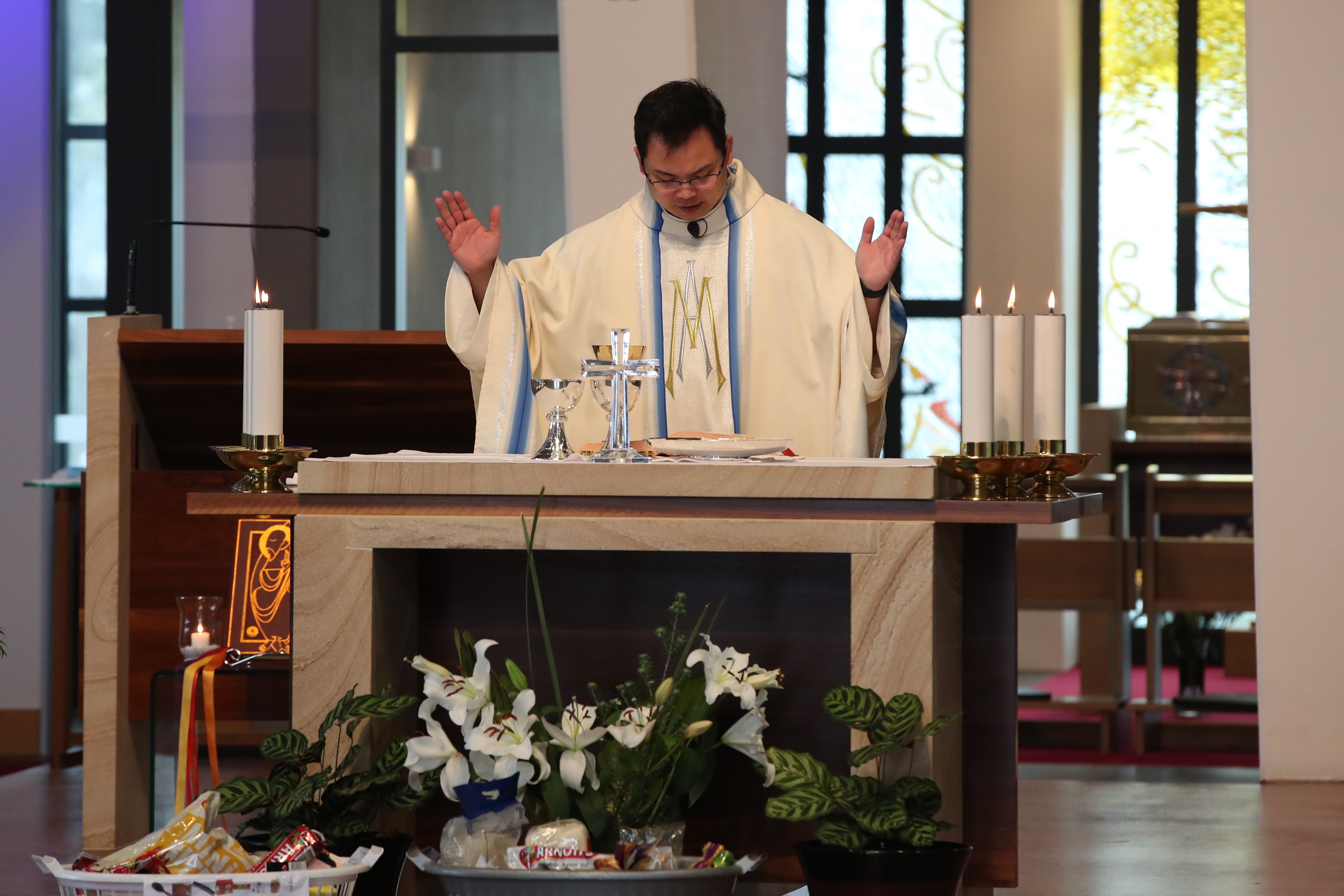The purpose of a Catholic School is for its members to live the mission of Jesus in daily experiences of school life. As a consequence, the essential culture of the Catholic School has emerged as being characterised as a community of faith, possessing a religious atmosphere, having positive human relationships, setting educational goals, engaging parental involvement and practising sound organisation and administration. At Marymount Primary, Religious Education is a key learning area standing alongside the other Key Learning Areas in our Catholic School Curriculum.
"The Lord Jesus made the deaf hear and the dumb speak. May he soon touch your ears to receive his word,
and your mouth to proclaim his faith, to the praise and glory of God."
In the baptismal ritual the Church commits itself to assist parents in the religious education of their children. The Archdiocese has undertaken to "promote faith learning that is life-long and life-giving" and to "nourish and co-operatively support through education the faith life of families". Marymount Primary School accepts as its mission to promote within its community the Gospel message of Christ and bring all members to a relationship with God.
This policy statement provides a basic description of the nature and aims of religious education that will guide parents, parishes, teachers and schools in their role as religious educators.
All people are created "in the image and likeness of God", and so are imbued with a natural spiritual yearning. They seek to understand themselves in the light of the transcendent. Any genuine education must address this religious dimension of life. In addition, initiation into the Christian community carries with it a continuing need to grow in understanding of and participation in the faith heritage that gives it life. Hence every young Christian, by reason of humanity and baptism, has a claim to be educated religiously.
Goals of Religious Education
The religious education of our Catholic young people at Marymount Primary seeks to foster their:
growth in relationship with God
knowledge and understanding of God as revealed by Jesus
understanding of Catholic tradition and their full participation in the life of the community
critical participation in society and its transformation in light of the gospel and Catholic tradition.
If students are to engage in religious education that achieves the above goals and the following implications require consideration:
The family is the first place where faith can be nurtured, and ideally provides occasions for education in faith for all its members right through life. Parish-based programs can provide for sacramental preparation, liturgical formation, formal catechesis for some, and many different opportunities for apostolic action and personal spiritual growth. The school is a proper setting for formal instruction in religion and in the teachings of the faith. Adolescents may also find groups and organisations that further contribute in different ways to their overall religious education.
No one form or setting can usually provide all that is required. Collaboration is needed to ensure a comprehensive, relevant and acceptable religious education of which young people may avail themselves.
Parents are described as "first educators of their children in the faith". In the home they can introduce young people to the lived reality of faith through prayer, moral formation, everyday expressions of love and reconciliation, good example and simple sharing of the faith journey. They also contribute appropriately to their children's formal instruction in the faith.
Religious education programs - in schools, parishes or other settings - provide more formal teaching in matters of belief, values and practice that equips the young person, according to each stage of development, for a free and intelligent expression of personal faith within the family, Christian community and wider society.
Young people should not be seen as merely passive recipients of religious education. Increasingly they have responsibility to choose and actively participate in religious education suited to their age, faith development and personal needs.
The Catholic school encourages and supports the religious education and faith development of its students in all areas of school life.
The experience of Christian belief and values being lived out within the daily community life of the school and their being explicitly presented in a variety of more structural learning situations (both within the broad curriculum and in formal Religious Education lessons) provide for this development.
The school's Religious Education program consciously seeks to identify and provide for a range of activities and situations that will achieve this.
Sacramental Program
The Sacramental Program is parish-based. Catechesis and sacramental preparation are related though distinct activities. Catechesis is the continuing process of faith education and development. Its goal is growth in maturity of faith. The school is involved in this area of catechesis through the religious education of the child. Sacramental preparation is the specific pastoral activity, involving family and parish community that precedes and accompanies celebration of the sacraments. Notification of the Parish Sacramental Program will be given each year through the Parish Bulletin and School Newsletter. For more information contact our APRE.

©Brisbane Catholic Education, Marymount Primary School (2022)